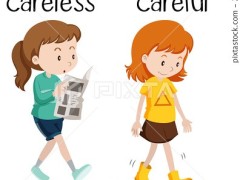front [frʌnt] n. 前面
【反】back 后面
【搭】at the front of 在……前部
* * *
A: I hope you go to the front.
B: I won't. I'm a shy man.
A:我希望你到前面来。
B:还是算了吧,我脸皮薄。
* * *
in front of 在……之前
* * *
A: I can't see because of the person in front of me.
B: We are way in the back, aren't we?
A:前边的人挡着,我看不见。
B:我们坐得太靠后了,对吧?
* * *
careful [ˈkɛəful] adj. 小心的,仔细的
【派】carefully 仔细地
【反】careless 粗心的
【搭】be careful 小心
* * *
A: I usually chat with strangers on the Internet.
A: You should be careful then.
A:我通常在网上和陌生人聊天。
B:那你可要小心啊。
* * *
vase [vɑːz, veiz] n. 花瓶
* * *
A: Can you help me find some porcelains with high quality?
B: Sure. How about tea sets or vases?
A:您能帮我选一些高品质的瓷器吗?
B:当然可以。茶具或是花瓶如何?
* * *
drop [drɔp] v. 掉下
【搭】drop in 拜访 drop off 下降
* * *
A: The temperature will drop below zero.
B: It's time for us to put on more clothes.
A:气温将降到零度以下。
B:到了该多穿些衣服的时候了。
* * *
flower [ˈflauə] n. 花
【派】flowerbed 花坛
【扩】petal 花瓣 pistil 雌蕊 stamen 雄蕊
* * *
A: The flowers are still in buds.
B: That's all right. The buds will soon blossom into flowers.
A:这些还是花蕾。
B:不要紧,这些蓓蕾很快就会开放的。
Lesson 40 What are you going to do? 你准备做什么?I'm going to... 我准备……
show [ʃəu] v. 给……看
【扩】reveal 展现 unshroud 展示
【搭】show sb. around 带某人游玩
show up 露面
* * *
A: Can you show me your new laptop?
B: Sorry, Kate borrowed it just now.
A:能让我看看你的新手提电脑吗?
B:对不起,凯特刚借走。
* * *
send [send] v. 送给
【派】sender 寄件人
【搭】send off 送行 send up 使上升
send out 发出
* * *
A: Where would you like me to send the flower?
B: I'll write down the address soon.
A:您想让我把花送到什么地方去?
B:我这就把地址写给你。
* * *
take [teik] v. 带给
【搭】take away 拿走 take out 取出
* * *
A: Welcome to my new house.
B: This is the gift I take for you.
A:欢迎来到我的新家。
B:这是我带给你的礼物。
adjective [原级]前面的,正面的;起掩护作用的;(语音)(元音)舌前的;(18穴高尔夫球场的)前9穴的;(足球等)踢前锋的 - The front page carries a photograph of the two foreign ministers.
noun [抽象名词]前面;(战争的)前线,前方;方面,领域;(非法或秘密活动的)掩护物,幌子 - One man sat in an armchair, and the other sat on the front of the desk.
verb [vt. 及物动词]在…担任领唱;主持(广播或电视节目);(建筑物,土地)面向;提供资金;领导,代表;<古> 面临,对抗;给(某物)装正面(或面);以舌前位发(元音);(语言学)将(句子成分)前置;<澳新> 露面,到达 - They never argued in front of their children.
in front of 在...之前
- The man is in front of the car. 在车的前面
- The man is in the front of the car. 在车的前坐位
preposition [位置和方向]在......前面:表示某物或某人位于另一物体或人的前方。 - He stepped in front of her, barring her way.
adjective [原级]仔细的,小心的;谨慎的,周密的 - Be very careful with this stuff, it can be dangerous if it isn't handled properly.
Be careful while handling fragile items. 搬运易碎物品时要小心。
noun [抽象名词]小心;当心 - You have to be careful what you say on telly.
verb [vt. 及物动词]投,丢;躺倒;剔除,除名;停止,放弃;中途卸客,中途卸货;寄,送,写(信);(道路、地面等)急剧向下倾斜;突然终止与(某人)的(恋爱)关系;(使)掉落;减少,降低 - Temperatures can drop to freezing at night.
noun [抽象名词]滴,少量;下降;落差;<非正式>递送,交付;<美>邮政信箱,邮筒;(赃物、非法物、秘密物品的)藏匿处;垂幕,升降幕;(绞刑架的)下落板 - He was prepared to take a drop in wages.
- Don't drop it! 不要掉下来!
- Don't drop the glass; it might break.
- Don't drop the fragile item!
noun [专属名词]花瓶,(装饰用的)瓶 - What am I bid for this vase?
noun [专属名词]【名】 (Vase)(塞、罗、芬)瓦塞(人名) - Hillary clobbered him with a vase.
vases 花瓶(复数)
- She placed a bouquet of flowers in the vase.
- The shelves were filled with various vases of different shapes.
noun [专属名词]花,开花植物;精华,最好的部分 - Each individual flower is tiny.
verb [vi. 不及物动词]开花;繁荣,兴旺 - Several of these rhododendrons will flower this year for the first time.
flowers 花(复数)
- She received a beautiful flower as a gift.
- The garden was adorned with colorful flowers.
verb [vt. 及物动词]显示,表明;给…看,出示;(通过示范)教,解说;指给某人看,指出;带领,引领;(情感、品质等的)流露,表露;(对某人)表现出,对待;显示出,流露出;容易显出,容易看到;标示,表明(信息、时间、计量);描绘,表现(为);放映,播出;展示,展出;<非正式> 证明,表明;如约赶到,露面 - Show me which picture you drew.
noun [抽象名词]演出,歌舞表演;(电视或广播)节目;展览,展览会;(体现内心感受的)动作,行为;装出的样子,虚假的外观;鲜艳悦目的景象;<非正式> 事情,场面;<非正式> 表现;动物比赛;场面,场合;<非正式> 滑稽场面,洋相;(分娩或月经时的)见红,现血,血先露;<非正式> (做某事的)机会,时机 - Research shows that young people still look to parents as their main source for health information.
verb [双宾语动词]邮寄,发送;传达,告知;派遣,打发,安排去;使快速(或猛然)移动;使作出(某种反应),使表现出(某种行为);排放,排出(烟或化学反应的产生物等);<非正式> 使着迷,使入迷 - I sent a copy to the school principal.
- send a letter 寄信
- send sth. to sb. /send sb. sth. 给某人送(寄)什么东西
- send a card / a message / a letter
- send me a card = send a card to me
send/take children to school:
take 强调某人亲自送;send 则是通过第三人去送, 如美国的校车
- take flowers to his wife 自己送
- send flowers to his wife 叫店里的人送
noun [抽象名词]<英>邮政,邮递;<英>邮件,包裹;<英>收集(或投递)邮件的时间,邮班;(尤指重要的)工作,职位;岗位,工作地点;哨岗,哨位;营区,军营;柱,杆,桩;(赛马的)起点标杆,终点标杆(the post);球门柱;邮报(用于某些报纸名称中);帖子,在线留言板上的信息;<美>驻军,卫戍部队;<美>退伍军人协会地方分会;篮球场上篮筐附近的区域;策应位置 - There was no post except the usual junk addressed to the occupant.
verb [vi. 不及物动词]<英>邮寄,投递;<英>把(信件等)投入邮筒;<英>把…放入(或塞入);派驻,委派; 使驻守,布置…站岗;;张贴(标志、通知等),公布;宣布,公布(尤指财务报表);支付(尤指保释金等);宣布(军人)失踪(或死亡);(运动员,参赛队)取得(成绩),创造(纪录);(在因特网上)公布信息,发帖子 - Officials began posting warning notices.
preposition [位置和方向]在…之后 - Keep me posted on your progress.
① vt. 派任,委派(与人连用)
- I must definitely get that fellow posted.
- Two months ago, Horst was posted to Paris.
② vt. 邮寄(与物连用,美语用 mail)
- He posted me a Christmas card last year.
- Would you please post this parcel for me?
verb [vt. 及物动词]携带,拿走;带去,引领;把…...带到(另一个层次、层面等);拿,取;移走,拿走;偷走,误拿;取材于,收集;攻占,控制;选中,买下;经常购买(某报纸或期刊);吃,服用;减去;记录,摘录;照相,摄影;量取,测定;就(座);以…...为例;接受,收取;接纳,接待(顾客、患者等);遭受,经受;忍受,容忍 - If you take something, you reach out for it and hold it.
noun [抽象名词](一次拍摄的)镜头,场景;收入量;<美>(入场券的)售得金额;看法,态度;(印刷)一次排版量 - She couldn't get it right – she never knew the lines and we had to do several takes.
verb [vt. 及物动词]拿来,带来; 使…转入(新的话题);移动;使处于某种状况;导致,引起;起诉;提供;强迫(自己)做;标价,售价为 - If you bring something somewhere, you move it there.
反义词:take [teɪk] : v. 带 走
bring sth.\sb. to…
- Bring your new girlfriend to me. 把你的新女朋友带来。
take sth.\sb. to…
- He took this ring to his wife. 他把这个戒指带给了他老婆。











